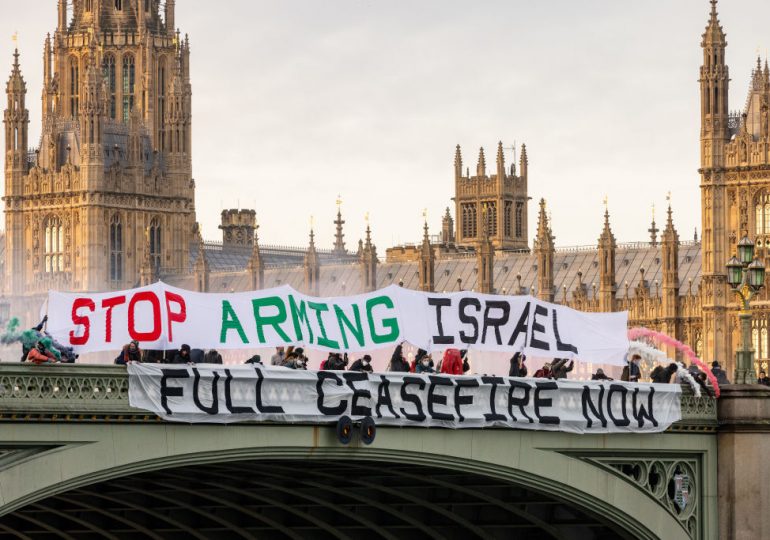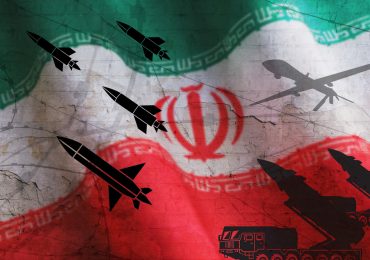When Israel launched its retaliatory war to root out Hamas from Gaza in the aftermath of the group’s Oct. 7 massacre, it had the overwhelming support of a horrified world. Six months on, Gaza lies in ruin. Its 2.3 million population, most of whom have been internally displaced, faces widespread famine. More than 33,000 Palestinians, the majority civilians, have been killed. And Israel, once backed by the full-throttle support of its closest allies, appears more isolated than ever before.
[time-brightcove not-tgx=”true”]
Nothing exemplifies this isolation more than the growing calls for the U.S., the U.K., and Germany to suspend arms sales to Israel. These calls, which have only grown louder in the days following the killing of seven World Central Kitchen aid workers in an Israeli airstrike, are now coming from some of the highest levels of transatlantic politics.
In the U.S., 56 congressional lawmakers (among them former House speaker Nancy Pelosi) penned a letter urging President Joe Biden and Secretary of State Antony Blinken to withhold further weapons transfers to Israel until a full investigation into the deadly airstrike concludes, and to condition future assistance to ensure its compliance with U.S. and international law. One, Sen. Elizabeth Warren, even went so far as to say that Israel’s actions in Gaza could legally be considered a genocide.
Read More: ‘It’s Not Just a One-Off Incident:’ What the World Central Kitchen Deaths Reveal
In the U.K., Prime Minister Rishi Sunak is facing mounting pressure from parliamentarians and legal experts alike to suspend arms sales following revelations that the government received legal advice that Israel has broken international law in Gaza. Meanwhile, in Germany—which this week faces allegations brought forward by Nicaragua at the International Court of Justice (ICJ) that it is “facilitating the commission of genocide” in Gaza by supplying arms to Israel—hundreds of civil servants have reportedly written to Chancellor Olaf Scholz and other senior ministers calling on Berlin to “cease arm deliveries to the Israeli government with immediate effect.”
Central to all of these calls is a concern over whether Israel’s conduct in Gaza could constitute a breach of international humanitarian law—and, if so, what it means for the countries that have backed the Israeli war effort with arms and assistance. If Western weapons are found to have been used in the perpetration of war crimes (or, worse, genocide) in Gaza, what culpability could their suppliers face? If Israel is deemed to have fallen on the wrong side of international law, could it bring its allies down with it?
Legal experts tell TIME that the answer largely depends on which laws and treaties one consults. Among the most emphasized is the international Arms Trade Treaty, in which Article 7 requires party states to undertake a risk assessment of all arms transfers—and, where there’s an overriding risk that those arms could be used to commit or facilitate violations of international humanitarian law, to prohibit their export. The U.S. hasn’t been a party to the U.N. treaty since former President Donald Trump withdrew from it in 2019. (Washington does, however, have its own domestic legislation that prohibits it from providing military assistance to foreign military units suspected of committing human rights violations.) But it nonetheless applies to 113 other state signatories, including Germany, which is the second-largest provider of arms to Israel after the U.S. Some countries, including Canada and Italy, have already opted to halt their arms exports to Israel, citing concerns over their compliance with domestic and international law. In the Netherlands, the government was ordered to suspend its delivery of F-35 fighter aircraft after a Dutch court determined that there was a “clear risk” that they could be used to violate international humanitarian law.
Such a precedent could have serious implications for the U.K., a signatory, which despite providing far fewer arms to Israel has suspended its exports in the past: First in 1982, and then again in 2009. While the British government contends that its arms sales to Israel are compliant with international law, human rights organizations have argued that this position is inconsistent with mounting evidence of war crimes. “They’re very well aware that there’s equipment that they’ve currently already licensed, and component parts of equipment that they’ve licensed, that are likely to be used by the IDF in Gaza now,” Yasmine Ahmed, the U.K. Director of Human Rights Watch, tells TIME. “That means that they’re clearly breaching those obligations under international law.”
The obligation that perhaps looms largest over Gaza is the responsibility that states have to prevent and punish genocide under Article 1 of the Genocide Convention. In a landmark decision in January, the ICJ determined in an interim judgment that there is a plausible risk of Israel committing genocide in Gaza. While this doesn’t constitute a definitive ruling (genocide cases can take years to resolve), it does put Israel’s allies on notice. “It makes countries aware that there’s that risk,” Ahmed says. “Continuing to provide arms to Israel when an apex U.N. court has said that there’s a plausible risk of genocide means that there’s a very serious risk that countries are also violating the Genocide convention, to the extent that they’re failing to prevent genocide by continuing to arm Israel.”
That prospect, and the potential criminal liability that comes with it, has prompted concern among British civil servants overseeing U.K. arms exports to Israel, who last week requested to “suspend all such work” over fears that it could put them in legal jeopardy. Their request came a week after a third U.S. State Department official publicly resigned over the Biden administration’s handling of the war in Gaza—a decision that Annelle Sheline, who served in the office devoted to promoting human rights in the Middle East, attributed to the administration’s “flagrant disregard for American laws” and the inability of her or other federal employees to influence policy. Indeed, State Department staff have reportedly sent at least eight internal dissent memos registering their disapproval of U.S. policy on the war, according to the Independent. By contrast, just one was sent during the first three years of the Iraq War.
Read More: How Israel and Its Allies Lost Global Credibility
Michael Becker, a professor of international human rights law at Trinity College in Dublin and a former associate legal officer at the ICJ, tells TIME that in a situation where the ICJ has already determined that Israel’s actions in Gaza constitute genocide, “it would then be possible for another state that has provided arms to Israel—if such arms were used to commit genocidal acts—also to be found to have violated international law.” He adds, however, that it is difficult to prove that a state was legally complicit in genocide as it would require proving that the state was aware of another state’s genocidal intent; it’s easier to prove that a state failed to meet its international obligation to prevent genocide, the responsibility for which is triggered the moment state learns there’s a serious risk that genocide will be committed. Nicaragua’s case against Germany at The Hague, a ruling on which is expected in the coming weeks, rests on the latter argument.
While what it means to meet one’s obligation to prevent genocide can vary from state to state depending on their relative capabilities or leverage, “Lawmakers in the U.S. and the U.K. and elsewhere need to be thinking very carefully about whether their conduct puts them at risk of violating or breaching their obligation to prevent genocide,” Becker says, adding: “I don’t think it’s a very big leap from that understanding of the obligation to prevent genocide to the conclusion that it’s problematic to continue providing arms to Israel without any meaningful safeguards.
While a judgement on whether Israel has committed genocide is likely years away, if the ICJ were to determine that Israel had committed acts of genocide in Gaza and found that its allies who supplied arms did so with full knowledge of risk, among the tangible consequences that states could face include an order from the ICJ to take remedial action, such as paying financial reparations. What’s less clear, however, is how such orders could be enforced. “The ICJ has no means of enforcing its decisions,” Becker says. “At the end of the day, the ICJ has to rely on others to carry out its decisions.”
Leave a comment








